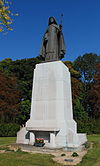- Saint Colette
-
Saint Colette Born 13 January 1381
Corbie, PicardyDied 6 March 1447 (aged 66)
GhentHonored in Roman Catholicism Beatified 23 January 1740 Canonized 24 May 1807 Feast Mar. 6th, Feb. 7th Saint Colette (13 January 1381 – 6 March 1447), born Nicolette Boylet (or Boellet), was an abbess and the foundress of the Colettine Poor Clares, a reform movement of the nuns of the Order of Saint Clare (the Clarisses).
Contents
Life
Born in Corbie in Picardy, in January 1381, her father, Robert Boellet, was the carpenter of the famous Benedictine Abbey of Corbie. Her mother's name was Marguerite Moyon. After her parents died in 1399, she joined the Beguines but found their manner of life unchallenging. She received the religious habit of a tertiary of the Franciscan order in 1402,[1] and became a hermit under the direction of the Abbot of Corbie, living near the abbey church. After four years of following this ascetic way of life, from 1402 to 1406, through several dreams and visions, she believed that she was being called to reform the Poor Clares, and return it to its original Franciscan ideals of absolute poverty and austerity.
In October 1406, she turned to the Antipope Benedict XIII of Avignon who was recognized in France as the rightful pope. Benedict received her in NICE, in South FRANCE, and allowed her to enter the Franciscan order of Poor Clares and empowered her by several Papal Bulls, issued between 1406 and 1412, to found new monasteries and complete the reform of the order.[2]
With the approval of the Countess of Geneva and the aid of the Franciscan itinerant preacher, Henry of Beaume (her confessor and spiritual guide), Colette began her work at Beaume, in the diocese of Geneva. She remained there a short time. In 1410, she opened at Besançon her first monastery in an almost-abandoned house of Urbanist Poor Clares. Thence her reform spread to Auxonne (1412), to Poligny (1415), to Ghent (1412), to Heidelberg (1444), to Amiens, and to other communities of Poor Clares. To the seventeen monasteries founded during her lifetime must be added another begun by her at Pont-à-Mousson in Lorraine. For the monasteries which followed her reform, she prescribed extreme poverty, going barefoot, and the observance of perpetual fast and abstinence.
During the Council of Constance she wrote to disavow Benedict, and during the Council of Basel she wrote to ask the bishops to withdraw.
She also inaugurated a reform among the Franciscan friars (the Coletani), not to be confounded with the Observants. These Coletani remained obedient to the authority of the provincial of the Franciscan convents, and never attained much importance, even in France. In 1448 they had only thirteen convents, and—together with other small branches of the Order of Friars Minor--were suppressed in 1517 by Leo X.
In addition to the strict rules of the Poor Clares, the Colettines follow their special constitutions sanctioned in 1434 by the then-Minister General of the friars, William of Casale, and approved in 1448 by Pope Nicholas V, in 1458 by Pope Pius II, and in 1482 by Pope Sixtus IV.
Colette died at Ghent in March 1447. She was beatified 23 January 1740, and canonized 24 May 1807. The Colettine nuns are found today, outside of France, in Belgium, Germany, Spain, England, and the United States.[3]
Pictures
External links
Bibliography
- Colette of Corbie (1381 - 1447): Learning and Holiness, Franciscan Institute Publications, 2010. ISBN 9781576592175
References
- ^ Farmer, David (ed.) Oxford Dictionary of Saints, Oxford University Press (1997), p. 108
- ^ Farmer, David (ed.) Oxford Dictionary of Saints, p. 108
- ^ Catholic Encyclopedia: Saint Colette
Categories:- Belgian Roman Catholic saints
- French Roman Catholic saints
- Franciscan saints
- Founders of Roman Catholic religious communities
- 1381 births
- 1447 deaths
- Beguines and Beghards
- 14th-century Christian saints
- 15th-century Christian saints
- 14th-century Christian female saints
- 15th-century Christian female saints
- Medieval French saints
- People from Picardy
- Poor Clares
- Franciscan hermits
Wikimedia Foundation. 2010.







